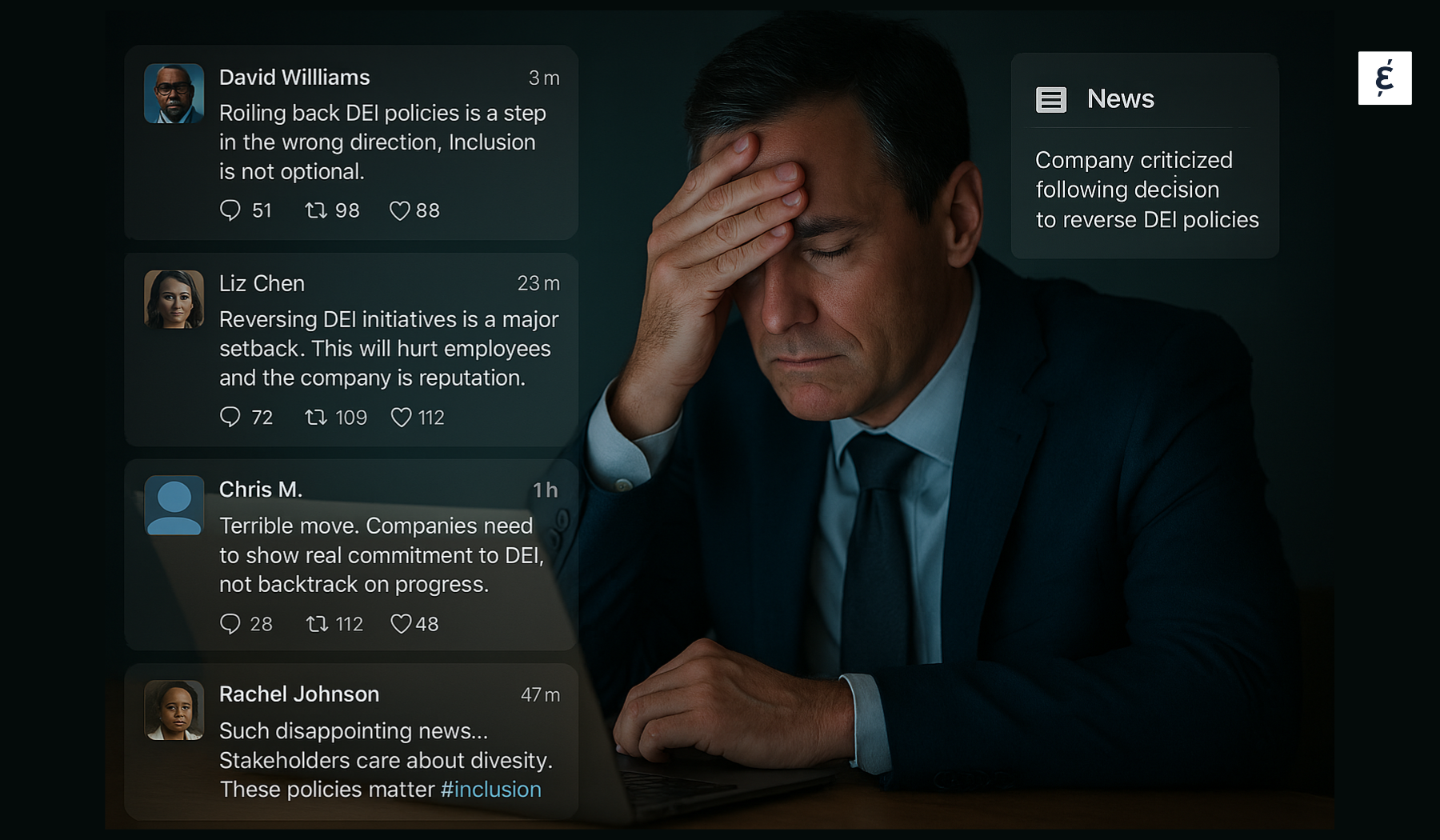

What do people think of companies that are still doing business in Russia — and why ought that concern anyone responsible for corporate brand or communications?
When Russia invaded Ukraine in February 2022, Western companies faced mounting pressure to pull out of Russia and punish Putin’s regime.
Hundreds suspended their operations or left Russia entirely — but many didn’t.
Back then, we published a study showing that companies that remained in Russia had harmed their reputation.
Public criticism of the “remainers” soon followed, too.
“Shameful and unethical,” screamed one media commentator.
“There isn’t a ‘both sides’ anymore,” declared another.
“If their morals won’t cause them to leave the country, a public backlash might,” predicted a third.
But what do people think today?
Ahead of the second anniversary of Russia’s invasion, we wanted to know what impact — if any — the decision to leave or remain in Russia has had on corporate reputation.
To find out, we surveyed more than 5,000 people in five countries — the UK, the US, Denmark, France and Germany — and asked what they thought about 18 global companies that have either left Russia completely or remained.
You can see the full results in our perception brief, Reputation Roulette.
There’s plenty to explore, from public awareness of which Western companies are still in Russia to attitudes toward the very notion of doing business there.
This article focuses on one topic explored in the brief: the impact on reputation.
To do so, let’s first consider the following hypothesis.
If remaining in Russia is “shameful and unethical” — if there’s no “both sides” argument, only a “backlash” against companies still doing business in Russia — then you might expect those businesses to be judged more harshly than those that have pulled out.
And that’s certainly the case … in some countries.
Take Denmark, a nation known for its social democracy and liberal values — as well as a staunch pro-Ukraine position to this very day.
The average Trust & Like Score — our chief metric of corporate reputation — given to companies that Danish respondents believe have pulled out of Russia is 67 (out of 100).
The average score given to companies that Danish respondents believe have remained in Russia with no intention of leaving is 37.
To put it another way, any company with a Trust & Like Score of 37 has a big problem with its reputation.
And that 30-point gap reflects a “reputational penalty” that Danes impose on remainers.
There’s a similar, if not quite as dramatic, result in Germany.
Respondents there give companies they believe have left Russia an average score of 69 — and 61 to those they believe have no intention of leaving Russia. A similar pattern is seen in the UK.
By contrast, Americans appear to impose no such penalty.
The average Trust & Like Score given to companies that US respondents believe have left Russia is 77.
Sounds like a reputational “reward” for having pulled out, right?
Here’s the thing.
Companies believed to still be in Russia with no intention of leaving get 75.
That’s a very good Trust & Like Score at the best of times — but especially so for companies deemed by some to be “shameful and unethical”.
The results from France were quite similar.
Companies believed to have left Russia received an average Trust & Like Score of 65 in France, whereas those believed to have no intention of leaving Russia got 64.
So what are we to make of all this, then?
One conclusion might be that in the US and France, there’s no real reputational upside to leaving Russia — and, similarly, no real reputational damage done by staying.
After all, respondents there trust and like “leavers” and “remainers” just as much.
Another conclusion is that people in Denmark, Germany and the UK care more about the implications of doing business in Russia while its war with Ukraine continues.
In those countries, companies thought to have left Russia are “trusted and liked” more than those thought to still be in Russia with no intention of leaving.
A third conclusion is that reputation clearly matters, but not everyone assesses it in the same way.
Europeans are, for the most part, more judgmental than Americans about companies that are still doing business in Russia.
Geography might explain that. The war is much closer to home for Europeans, and the perceived Russian threat is greater.
A different media diet or “narrative” may also explain why Americans “trust and like” companies that are still in Russia more than Europeans.
More broadly, here are our three takeaways for brand and communications specialists.
Corporate reputation comprises the perceptions of many other stakeholders, including investors, legislators, regulators, media, suppliers, and current and potential employees.
To put it bluntly, a company that’s still doing business in Russia may well get the same Trust & Like Score as one that left months ago — but will it find it as easy to raise capital, influence legislators, get favorable media coverage or hire graduates?
Clearly, what works in one market won’t work in another. Stakeholders in countries that are geographically or politically closer to the conflict are likely to be more judgmental about business decisions associated with it.
Brand positioning and communication strategies need to be tailored accordingly. Instead of adopting a one-size-fits-all approach, companies should craft specific campaigns. A business decision that is unremarkable in one region may ruffle feathers in another and demand a different set of key messages for the media and other stakeholders.
For companies doing business in Russia, there seems to be little reputational downside to doing so, at least in the US or France.
But that isn’t to say that companies’ reactions to such a critical geopolitical conflict do not affect their reputation, or that reputation simply doesn’t matter — only that this issue doesn’t appear to affect stakeholder perceptions as much as before.
Clearly, perceptions have shifted over the last two years — perhaps because people are hearing less about the issue, are less interested in it and are less outraged.
But companies beware. Perceptions could easily change again. As soon as the conflict moves to a new phase or a new one erupts, attention to this issue is likely to resume.






© 2024 Group Caliber | All Rights Reserved | VAT: DK39314320